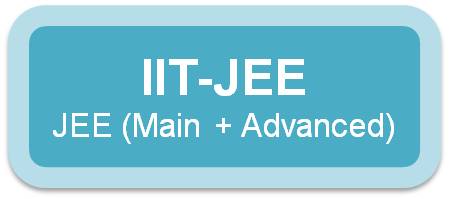IIT JEE SYLLABUS PDF free Download :-
| JEE MAIN | JEE ADVANCED | JEE QUESTIONS |
|---|---|---|
| Exam Pattern | Exam Pattern | MATHS |
| SYLLABUS | SYLLABUS | PHYSICS |
| ELIGIBILITY | ELIGIBILITY | CHEMISTRY |
The first IIT, IIT Kharagpur, started in 1951. In the initial few years (1951-1954) students were admitted on the basis of their academic results followed by an Interview in several Centers across the country. From 1955-1959 admission was via an all India examination held only for IIT Kharagpur (other IITs had not started by then). Branches were allotted through Interviews/counselling held at Kharagpur.[citation needed]
The common IIT-JEE was conducted for the first time in 1960, when it had four subjects including an English language paper. The examination since evolved considerably from its initial pattern. The IIT-JEE was initially called the Common Entrance Exam (CEE); its creation coincided with that of the 1961 IIT Act.

Joint Entrance Examination (JEE) is an all India common entrance examination which is conducted for admission in various engineering courses like B.Tech, B.E, B.Arch and B.Planning under the direction of Ministry of Human Resource Development (MHRD).
In 2012, CBSE (Central Board of Secondary Education) has announced this common examination in place of AIEEE and IIT-JEE. JEE (Joint Entrance Examination) is being conducted into two parts, JEE-Main and JEE-Advanced. JEE-Main exam is to admission in NITs (National Institute of Technology), IIITs (Indian Institute of Information Technology), CFTIs (Central Funded Technical Institute), etc. and JEE-Advanced is for admission in IITs (Indian Institutes of Technology), Banaras Hindu University (IIT-BHU) and the Indian School of Mines (ISM), Dhanbad. In September 2013, IIT Council approved the decision of the JAB (Advanced) to continue with the two-phase JEE pattern for 2014
The Joint Admission Board (JAB) of the Indian Institutes of Technology (IIT) that met on 15 September, have decided to continue with the offline format (paperand pencil) of JEE Advanced for the next year, 2014.
JAB has also decided that the JEE-Advanced 2014 will be held on 25 May, 2014. The date will soon be announced officially. JEE Main 2014 is tentatively scheduled to take place on 6 April, 2014. The official dates for JEE Main will soon be confirmed by CBSE.
Meanwhile, JAB has decided against an online JEE Advanced this year. They will also soon set up a committee to study the online process and implement it in future
There will no changes for the 2014 exams. We will follow a systematic approach before implementing the computer-based test. The board will set up a committee to study the online process and only then will implement it in future.
JEE Main exam has two papers, Paper-1 and Paper-2. Candidates may opt for either or both of them. Both papers contain multiple choice questions. Paper 1 is for admission to B.E./B.Tech courses. It is conducted both online and offline. Paper-2 is for admission in B.Arch and B.Planning courses. It is conducted offline only.
JEE Main has a fixed exam structure. The paper-1 is of three hours duration and consists of thirty multiple choice (single-correct) questions in each of the three subjects (physics, chemistry and maths). There is negative marking for incorrect answers. 4 marks are awarded for correct answers and 1 mark is deducted for incorrect answers.[6]
1.3 million candidates appeared for JEE Main in 2014.In 2016, JEE Main was conducted on 3 April 2016 (offline mode) and April 9 and April 10, 2016 (online mode).[8] Results for JEE Main 2016 exam was declared on April 27, 2016 on their official websites.